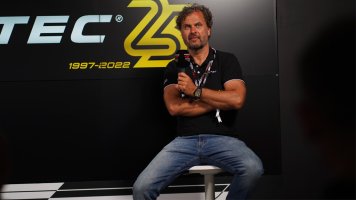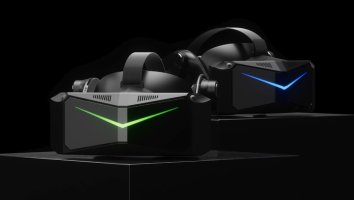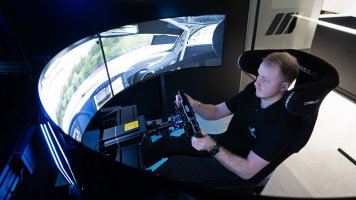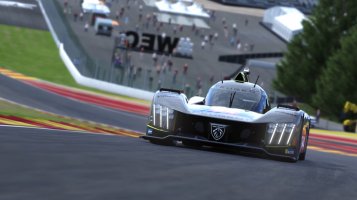You are using an out of date browser. It may not display this or other websites correctly.
You should upgrade or use an alternative browser.
You should upgrade or use an alternative browser.
Volkswagen 'Shocks' its Competitors
- Thread starter Davide Nativo
- Start date
I still think they'll find the way to break emission regulations.
Well it's not like the coal plant that made the electricity polluted at all. Oh wait...
How much horsepower is lost with a conventional petrol or diesel between the bottom and the high altitude at the top.
I guess the electric is unaffected by atmospheric pressures the same / prob run better the nearer the top given it will be cooler/better for the battery cooling?
Obviously this is all my speculation haha
I guess the electric is unaffected by atmospheric pressures the same / prob run better the nearer the top given it will be cooler/better for the battery cooling?
Obviously this is all my speculation haha
Because for some people, me included, "sound is everything", the sound is what makes me really love a race or a car (I didn't care at all about the 911 RSR GTE, and I love it now it has a fantastic sound), it's what takes my breath away, it's what gives me shivers down my spine.
Well what is it about that sound that gives you those emotions? I would suggest that it's because those sounds are associated with going fast. Now if electric is the fastest, quickest thing around, I think the next generation will associate growling v8's with slow and the whine of electric engines with fast.
The same thing has happened throughout history. Steam trains and the sounds and smells used to be to a generation, the fastest thing around until Diesel trains showed up. Now steam trains are cool, but sound quaint and slow. Airplanes as well had this effect. Prop planes were the hottest thing around until jets showed up. Now the sound of a prop beating the air sounds slow and antiquated where as a jet sounds powerful and fast. This is really no different.
Davide Nativo
Premium
How much horsepower is lost with a conventional petrol or diesel between the bottom and the high altitude at the top.
I guess the electric is unaffected by atmospheric pressures the same / prob run better the nearer the top given it will be cooler/better for the battery cooling?
Obviously this is all my speculation haha
As I wrote in my other article, combustion engines have a thermal efficiency of about 27% on average. Which means that of all the power they produce, just 27% of it actually pushes the car forward. The remaining 73% is wasted through heat, friction or exhaust smokes. Electric drives have a thermal efficiency of about 90%, which means that only 10% of the power produced is wasted through friction or heat.
Electric drives are not affected by atmospheric pressure and have no need for a conventional radiator like combustion engines, hence why these cars have no radiator intake at the front. However, turbo engines are not affected either by atmospheric pressure like gasoline engines, but they do produce more heat and need more cooling.
Last edited:
Well what is it about that sound that gives you those emotions? I would suggest that it's because those sounds are associated with going fast. Now if electric is the fastest, quickest thing around, I think the next generation will associate growling v8's with slow and the whine of electric engines with fast.
The same thing has happened throughout history. Steam trains and the sounds and smells used to be to a generation, the fastest thing around until Diesel trains showed up. Now steam trains are cool, but sound quaint and slow. Airplanes as well had this effect. Prop planes were the hottest thing around until jets showed up. Now the sound of a prop beating the air sounds slow and antiquated where as a jet sounds powerful and fast. This is really no different.
Clearly you just don't "get it", and many do not. The sound of an ICE for many contributes to the Atmosphere, arguably the most important aspect of the "atmosphere". Yes millenials will associate electrics with speed, but they still sound awful. Personally I find that "whine" damn irritating. It's like going to a concert and the bands playing with just one 40 amp speaker. Sure you can "see" them play their stuff but the sound is non existent or tosh.
Clearly you just don't "get it", and many do not. The sound of an ICE for many contributes to the Atmosphere, arguably the most important aspect of the "atmosphere". Yes millenials will associate electrics with speed, but they still sound awful. Personally I find that "whine" damn irritating. It's like going to a concert and the bands playing with just one 40 amp speaker. Sure you can "see" them play their stuff but the sound is non existent or tosh.
Don't get me wrong, I like the sound too. But realize that we like the sound due to subjective influences that we've had growing up. The sound of a gasoline powered motor vs an electric motor is not objectively "better". It's purely cultural, and all I'm doing is pointing out that in 100 years I suspect you'll have people debating whether the old electric racing engines sound better than the new anti-grav "whisper" engines.
Well it's not like the coal plant that made the electricity polluted at all. Oh wait...
As a matter of fact, this car was charged from lemons, kids going down a zip line and solar panels
I cannot say if this is a good or a bad thing for Petrolheads like me...
Maybe we turn to "electricheads" or something…
Well said!!!
Maybe we turn to "electricheads" or something…
Because for some people, me included, "sound is everything", the sound is what makes me really love a race or a car (I didn't care at all about the 911 RSR GTE, and I love it now it has a fantastic sound), it's what takes my breath away, it's what gives me shivers down my spine.
I can appreciate electric racing cars, I even like their sound, but I can't appreciate replacing some of the best souding racing cars (DTM, SGT, WRC, WRX) by electric cars, it just kills any interest for me.
Moreover, hearing the engine sound, the gear change, how the engine revs, gives a lot of feedback, allows to feel a lot more how the car behave and adds a lot to the enjoyment too.
So yes, even with electric cars, WRC onboards will still be breathtaking, but sure I'll enjoy them a lot less.
And of course, when you're near the track, the sound of all cars is a big part of the enjoyment, of the ambience. A full electric Le Mans or the incoming full electric WRX will feel a lot more bland for spectators.
Electric is not the only alternative, and seeing most series going this route because it's the current trend pisses me off.
Well said!!!
Last edited:
Because for some people, me included, "sound is everything", the sound is what makes me really love a race or a car
More than a full century of internal combustion engine cannot be wiped out in a single year, fans will probably needs time, drivers more + electric engines doesn't need gearbox AFAIK (it was only there to ease the use of engine torque).
So new e-car = strange stealth noises + no gearbox at all, driving and setup experience is and will be something new to learn.
The worth is how they will harvest needed electric power ? Most countries doesn't renew their nuclear power plants, using coal would be ridiculous, and needed raw metals (nickel, cobalt and lithium) for manufacturing batteries as they are designed for now will runs out far before oil... Soapbox will come back very soon
But a gearbox multiplies torque to the wheels. And even an electric motor starts dropping torque after a certain amount of rpm. There is a guy who put an electric motor in a burned down F40, but left the gearbox in. In 2nd or 3rd the thing is crazy on the acceleration.
I would love to see some intrest from racing teams for hydrogen maybe? For work trucks, i think that is the future. Batteries weigh to much for long distance driving and affects maximum load so even more trucks needed.
I would love to put some solar panels on my garage to power a hydrogen generator at home. It doesn't need to be fast in generating hydrogen because just 1 tank is needed for me in 2 weeks or so.
I would love to see some intrest from racing teams for hydrogen maybe? For work trucks, i think that is the future. Batteries weigh to much for long distance driving and affects maximum load so even more trucks needed.
I would love to put some solar panels on my garage to power a hydrogen generator at home. It doesn't need to be fast in generating hydrogen because just 1 tank is needed for me in 2 weeks or so.
Don't get me wrong, I like the sound too. But realize that we like the sound due to subjective influences that we've had growing up. The sound of a gasoline powered motor vs an electric motor is not objectively "better". It's purely cultural, and all I'm doing is pointing out that in 100 years I suspect you'll have people debating whether the old electric racing engines sound better than the new anti-grav "whisper" engines.
I disagree that its because of subjective influences, some people prefer loud noises.
Why do you think there are so many complaints when a dev team gets the sound of an engine wrong?
Bottom line is for many the shift to electric will be a huge disappointment and there's no amount of "saving the earth" or "the electric cars/bikes are better now" will change that.
I can remember the times that I first heard a Harrier jump jet SO loud, a Tornado going into a full afterburner climb SO loud and the ground shook! When I first saw a Vulcan as it took off SO loud.....I like loud things!
Mining for neodymium to make magnets is so toxic that it's banned in every country in the world except one spot in China and one spot in Africa. Cobalt has it's own issues as well. Windmills chew threw gear boxes at an alarming rate that is un-sustainable. So unless we build modern nuclear plants, this is a waste of time.More than a full century of internal combustion engine cannot be wiped out in a single year, fans will probably needs time, drivers more + electric engines doesn't need gearbox AFAIK (it was only there to ease the use of engine torque).
So new e-car = strange stealth noises + no gearbox at all, driving and setup experience is and will be something new to learn.
The worth is how they will harvest needed electric power ? Most countries doesn't renew their nuclear power plants, using coal would be ridiculous, and needed raw metals (nickel, cobalt and lithium) for manufacturing batteries as they are designed for now will runs out far before oil... Soapbox will come back very soon(Lance Armstrong new career maybe
)
Seems the event kinda outlived its real core qualities by now. Something I already felt with Loeb's record run so it doesn't have anything to do with electricity imo.
I guess the electric is unaffected by atmospheric pressures the same / prob run better the nearer the top given it will be cooler/better for the battery cooling?
Nope. The slightly cooler air doesn't compensate for the massive decrease in air density. It's much harder to dissipate heat near the top.
As I wrote in my other article, combustion engines have a thermal efficiency of about 27% on average. Which means that of all the power they produce, just 27% of it actually pushes the car forward. The remaining 73% is wasted through heat, friction or exhaust smokes. Electric drives have a thermal efficiency of about 90%, which means that only 10% of the power produced is wasted through friction or heat.
Electric drives are not affected by atmospheric pressure and have no need for a conventional radiator like combustion engines, hence why these cars have no radiator intake at the front. However, turbo engines are not affected either by atmospheric pressure like gasoline engines, but they do produce more heat and need more cooling.
Some corrections.
- It's not X% of the power they produce, but rather X% of the energy stored (in the fuel or batteries) that is converted into kinetic energy, or as you said, pushes the car forward.
- Electric drives are affected by atmospheric pressure, since the amount of heat dissipation limits the power output and charging rate of the battery, though you can compensate for this with an oversized (at sea level) cooling system.
- Most EVs do have radiators: Formula E cars have two, and most production EVs have one or more (Model S, Model 3, i3, Bolt, etc.).
- Finally, turbocharged engines are also affected by atmospheric pressure. As you said, they produce more heat and require more cooling than a NA engine, but the problem gets even worse as you go higher, since the turbo needs to work harder to create the same pressure in the intake manifold, which generates more heat and turbo lag than at sea level. That extra heat is also harder to manage, since the intercooler and radiator/s can't work as effectively. Again, you can compensate for this.
Last edited:
Latest News
-
VR Will Hit EA SPORTS WRC As A Beta On 30th AprilVR support will arrive for EA SPORTS WRC next week, initially in beta form, as features...
- Thomas Harrison-Lord
- Updated:
- 3 min read
-
New RaceRoom Drift Content and Community Cup Final At Tuning World BodenseAn in-person final for a RaceRoom community sim racing competition will be held at...
- Thomas Harrison-Lord
- Updated:
- 2 min read
-
Fanatec Renews F1 Partnership Amidst Investment PitchesOfficial Formula 1 branded sim racing continue will continue to be produced by Fanatec, as share...
- Thomas Harrison-Lord
- Updated:
- 3 min read
-
Funselektor Teases Another Potential New ProjectNot content with the upcoming 2D management title Golden Lap, the creators of Art of Rally look...
- Thomas Harrison-Lord
- Updated:
- 2 min read
-
F1 24’s Updated Driver Career Mode DetailedThe new aim of F1 24's driver career is to increase your recognition levels, and ultimately...
- Thomas Harrison-Lord
- Updated:
- 3 min read
-
Assetto Corsa Competizione’s Nordschleife Hits Consoles 2nd MayThe Nürburgring 24hr Pack DLC for Assetto Corsa Competizione arrives this time next week for...
- Thomas Harrison-Lord
- Updated:
- 2 min read
-
BeamNG Hotfix Adds Vehicle Detail Viewer And A Slew Of FixesBeamNG.drive's 0.32 update has been a huge hit with fans, the obligatory patch to partner the...
- Connor Minniss
- Updated:
- 3 min read











